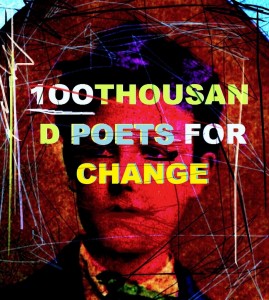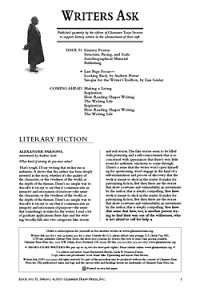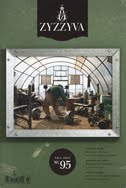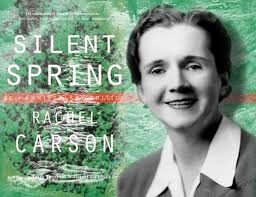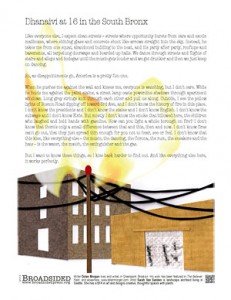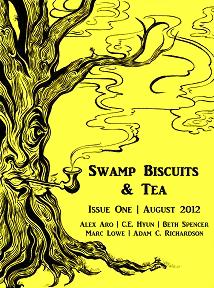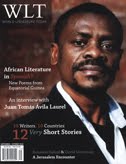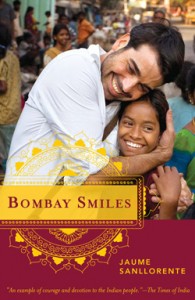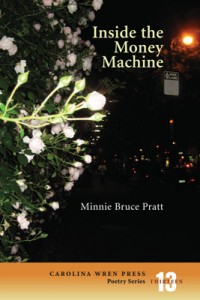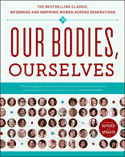Check out “Words are Weapons of the Strong”: An Interview with Nikki Giovanni on Sampsonia Way: An Online Magazine on Literature, Free Speech and Social Justice. This is a great conversation with Giovanni that goes into territory other than approach to writing, like what the poet has to say about gun control, about the occupy movement, and about the influence of the hip-hop generation in political campaigns. And a strong word on censorship for those “in control” and not often addressed: “Censorship, as the sign says, is bad for your health. I am totally against it. But, and this is a question you did not ask, can anyone anthologize or record or perform for a set price? Sometimes publishers, and sometimes families, who had absolutely nothing to do with the work, can hold up or deny another generation access to artistic work by refusing permission or in some cases making permission fees so high they cannot be met.”
NewPages Blog
At the NewPages Blog readers and writers can catch up with their favorite literary and alternative magazines, independent and university presses, creative writing programs, and writing and literary events. Find new books, new issue announcements, contest winners, and so much more!
Interview :: Nikki Giovanni
Spread the word!
Assaracus – 2012
Assaracus, a journal dedicated to providing a stage for gay poets and poetry, is a part of Sibling Rivalry Press, which also prints Lady Business: A Celebration of Lesbian Poetry. Rather than including a slew of writers in each issue, Assaracus introduces about a dozen writers, each with a short biography, and then dives into a several page spread of their work. This really allows the reader to get to know each individual writer in depth, rather than just giving us a quick taste. Continue reading “Assaracus – 2012”
Spread the word!
The Bellingham Review – Spring 2012
You will love the most recent Bellingham Review on a microscopic level; you will love it on a macroscopic level. You will find considerable literary achievement down to the expert punctuation. The writers in this journal have a mastery of plot and a quiet rebellion of framing stories in segments. When reading this journal—as long as you aren’t in a subway—you will discern almost aurally a powerful philosophical clarity. Continue reading “The Bellingham Review – Spring 2012”
Spread the word!
Blue Collar Review – Spring 2012
The editor’s note of this issue of Blue Collar Review reads, “We must not allow ourselves to become demoralized or cynical because to do so would be suicide. As poets, we must reclaim our culture and its narrative of community, solidarity and social conscience, recognizing the power of culture in defining our identity and vision.” Continue reading “Blue Collar Review – Spring 2012”
Spread the word!
Cave Wall – Spring 2012
Published twice a year, Cave Wall is dedicated to publishing the best contemporary poetry it can get its hands on. This family-run magazine is based out of Greensboro, North Carolina. I was fortunate enough to attend a reading where Editor Rhett Iseman Trull read her own poetry and participated in a Q & A. She was down to earth and intriguing, just like this edition of Cave Wall. The issue includes black and white art by Dan Rhett that compliments the poetry very well. Continue reading “Cave Wall – Spring 2012”
Spread the word!
Five Points – 2012
This issue of the internationally-renown literary journal is dedicated in memory to Virginia Spencer Carr who had passed in April of this year. Dr. Carr left a brimming trove of literary scholarship in her decades as a writer, researcher and professor, including what is considered her masterpiece biography: “The Lonely Hunter,” about Carson McCullers who was often critically classified as a Southern Realist. McCullers, Carr, and this journal share an affiliation—formal or otherwise—with the American South, including but not limited to Georgia State University, which sponsors Five Points, and where Dr. Carr taught for over two decades. Continue reading “Five Points – 2012”
Spread the word!
FLARE – Spring 2012
This magazine’s name was recently changed from The Flagler Review (which is now its subtitle) to FLARE, and the content of this issue sparkles in ways that justify the title. In addition to poetry, fiction, nonfiction, and visual art, FLARE includes screenplays/plays as a regular feature. Continue reading “FLARE – Spring 2012”
Spread the word!
Indiana Review – Summer 2012
Susan McCarty’s short fiction “Another Zombie Story,” in this issue of Indiana Review provides a flash of imagination that affirms hope in the midst of disaster. In ten linked thematic sections that are at times funny or ominous (but always insightful and compelling), the narrative warbles on a mysterious landscape, plays upon a portfolio of expectations and emerges resilient as the main character discovers love (and garden vegetables) against a backdrop of loss and instability. It is tightly drawn, lovely against an imagined—but all too real—wasteland. And isn’t darkly dramatic like other literary depictions of a wasteland: it rejects the nihilism that would characterize a wasteland; it teases along those shorelines and splashes right out of the water with a musical laughter you can hear through the pages. Continue reading “Indiana Review – Summer 2012”
Spread the word!
The Kenyon Review – Summer 2012
This issue of The Kenyon Review sustains the journal’s well-deserved reputation as an elite, erudite vehicle for criticism, fiction, and poetry. It opens with a long essay by distinguished philosopher and essayist George Steiner. “Fragments (Somewhat Charred)” consists of philosophical observations on, or circling about, aphoristic phrases allegedly appearing on a charred scroll found in Herculaneum. Steiner deconstructs, linguistically and semantically, eight of these—phrases like “When lightning speaks it says darkness,” and “Evil is.” Of “When Arion sings why do I weep?” Steiner says “[it] encapsulates a perennial fascination by the powers and effects of music in Greek sensibility. An uneasy inquiry into the penetration of sung and instrumental music into the human psyche.” Later in the essay, he continues, “We know of no human community that lacks music. . . . Could a musical experience be the only human encounter with time made free of temporality as we know it in biological and psychological processes?” Such questions intrigue us; the effort to explore them deeply constitutes a rare offering. Continue reading “The Kenyon Review – Summer 2012”
Spread the word!
The Liner – Spring 2012
As far as inaugural issues are concerned, The Liner’s maiden voyage couldn’t have gone much smoother. The journal includes short fiction, poetry, art, and photography along with an original questionnaire that corresponds to each author bio. Continue reading “The Liner – Spring 2012”
Spread the word!
Louisiana Literature – 2012
In journalism, the number of inches designated to a story or part of an article would be considered as political as the words themselves. In this way, excluding coverage was the best offense, and the arrangement of objects, ideas or celebrity becomes a politics of space. I enjoyed this issue of Louisiana Literature: a Review of Literature and the Humanities, affiliated with Southeastern Louisiana University, because of some of these kinds of editorial decisions that relate to a particular politics of space. The issue’s judicious arrangement of poems and stories become miles of ink dedicated to the issues central to our lives, not just the parents and the lovers and the dumpster divers, but to those miles of shoreline splashed with oil, against a decimated New Orleans skyline. Continue reading “Louisiana Literature – 2012”
Spread the word!
Monkeybicycle – Summer 2012
Normally, I like to review journals that I’ve never heard of. I love discovering new or less-acknowledged publications, mining foreign territory for literary gold. I try to stay as open as possible to new writers and new journals, and while what I find isn’t always great, it’s something unexpected every time. Continue reading “Monkeybicycle – Summer 2012”
Spread the word!
Moonshot – 2012
Only on its fourth issue, Moonshot is a relatively new kid on the block in Brooklyn’s indie literary scene. Eighty-five pages long, the themed issue “Correspondences” offers brief introductions to 30 authors—all of whom have been published before, but don’t yet have major name recognition. As alluded to in the editor’s note, this issue is gritty and real. Continue reading “Moonshot – 2012”
Spread the word!
Skidrow Penthouse – 2012
Skidrow Penthouse’s website assures us that their magazine does not contain homeless people in suggestive poses (sorry to disappoint). They also assure us that their magazine is not “hospitable to eat-shit-shower-and-shave writing, or any kind of literary undertaking that aspires only to disturb the flaccid ghost of Bukowski.” It is a journal that specializes in absurdist literature and art, offering a “home for wayward voices, insect souls, architects of gutter, a place to hide one’s rain.” Continue reading “Skidrow Penthouse – 2012”
Spread the word!
South Dakota Review – Winter 2011
When I first received my copy of South Dakota Review, I took one look at the cover—a photograph by editor in chief Lee Ann Roripaugh of roller derby queens “Olive Mayhem,” “Lady Boop,” and “Sandra D’vious”—and I knew I was in for a treat. Continue reading “South Dakota Review – Winter 2011”
Spread the word!
Versal – 2012
Amsterdam’s Versal is a thoughtful collection of sophisticated, inventive writing and art. For the celebration of their first ten years, the editors included a mixed media art piece titled “750 Circles” that is a blank page with a balloon taped to it. Each of these pages is signed by the editors. The piece, they say, is to honor the many people who have made the last ten years possible. Small flourishes of creativity like this appear throughout the journal, making it not only a collection of great writing, but a united reading experience. Continue reading “Versal – 2012”
Spread the word!
Verse Wisconsin – July 2012
In the July 2012 issue of Verse Wisconsin, co-editors Sarah Busse and Wendy Vardaman stress the importance of community, and everything about the print and online issues of the journal point to the wisdom of their claim. Before moving to Madison, Wisconsin in 2009, Verse Wisconsin was published by Linda Aschbrenner for 11 years as Free Verse. Aschbrenner continues to serve on Verse Wisconsin’s advisory board, along with B. J. Best, Cathryn Cofell, Ron Czerwien, Tom Erickson, Fabu, David Graham, Angela Rydell, and Marilyn L. Taylor. In other words, Verse Wisconsin is a celebration of community and poetry. Continue reading “Verse Wisconsin – July 2012”
Spread the word!
Whitefish Review – Summer 2012
Whitefish Review takes their readers away from the comforts of civilization and into the wilderness with this issue. Editors Cristina Eisenberg and Brian Schott made a call for submissions that “explore the untamable and wild in astonishing ways.” Over 40 writers, artists, and photographers answered this call, offering literature and art that “explores wildness in all its incarnations and paradoxes.” Continue reading “Whitefish Review – Summer 2012”
Spread the word!
Workers Write! – June 2012
Attempting to chronicle a war is a massive literary undertaking, but trying to piece together a cohesive narrative about a half dozen or so combat zones from the poems and short stories of 17 different authors sounds like, well, hell. I’m a Vietnam-Era veteran, and even though I was never in combat, I was close enough to it to know that literature rarely captures the truths of war and the combat zone. Continue reading “Workers Write! – June 2012”
Spread the word!
Brevity – Fall 2012
In response to the results of the VIDA Count (which counts the male to female ratio in publishing—I’ll let you guess which gender got the shorter stick), Brevity decided to put out a special issue called “Ceiling or Sky? Female Nonfictions After the VIDA Count,” which focuses on “the important contribution of female writers to the creative nonfiction movement.” Continue reading “Brevity – Fall 2012”
Spread the word!
Sweet – Fall 2012
The editors of Sweet say, “We want you to find something here that you need, something perhaps not as practical as a potato, but just as vital.” In this issue, I found something I “need,” and I found it in Anne Haines’s poetry. Contributing three poems, she was able to reach out of her poetry and capture my attention, stirring up feelings that I didn’t know I had. In “Night Language,” the middle stanza stands out: Continue reading “Sweet – Fall 2012”
Spread the word!
StepAway Magazine – Autumn 2012
Reading StepAway Magazine is taking a stroll down the streets of a city, though you’ll never know which city is next—it is all determined by the writers. StepAway Magazine is “hungry for literature that evokes the sensory experience of walking in specific neighborhoods, districts or zones of a city.” Each writer must do this in 1000 words or less. Continue reading “StepAway Magazine – Autumn 2012”
Spread the word!
Steel Toe Review – Summer 2012
I have never lived in the South (aside from the first two years of my life in Texas, which doesn’t count), and I certainly don’t know anything about Alabama, but this Birmingham-based magazine that strives to “provide a vehicle through which Alabama artists and artists from elsewhere can connect and find common ground” doesn’t seem foreign. In fact, it accomplishes its goal of uniting writers to a common ground. Continue reading “Steel Toe Review – Summer 2012”
Spread the word!
Swamp Biscuits and Tea – August 2012
I read this issue throughout the week entirely from my phone, in bed, before I fell asleep and started dreaming. It felt appropriate as all of these long stories contain an element of dreaming; some of the stories incorporate it more while others just mention a dream that the character had. Yet as much as these stories contain surreal and dream-like elements, the stories are about much more than fantasy. Continue reading “Swamp Biscuits and Tea – August 2012”
Spread the word!
Penduline – 2012
For an online publication, Penduline offers a massive amount to read in flash fiction, sudden fiction, prose poetry, and short fiction. This issue, themed “WTF?,” contains strange, but entertaining stories, no doubt aimed to make you say, “WTF?” Continue reading “Penduline – 2012”
Spread the word!
Amarillo Bay – August 2012
The amazing thing about online literature is that in order to put together an issue, the staff of a magazine doesn’t really have to be in close proximity. In fact, the founders of Amarillo Bay say that they haven’t lived closer to each other than 100 miles—and now live nearly 2,000 miles apart. Jerry Craven and Bob Whitsitt put out their first issue in 1999 and are now in their fourteenth year of publishing. This issue contains a wonderful collection of fiction, nonfiction, and poetry. Continue reading “Amarillo Bay – August 2012”
Spread the word!
Poecology – August 2012
Poecology, for me, was a return to the earth, to nature. The poems, dealing with crops, rivers, apples, bugs, sparrows, and summer squash, made me want to go outside, lay down in the grass, and breathe in the fresh air. Of course, instead, I sat in my house, cuddled with my cat, and finished reading and writing from a digital screen, but for brief moments, it was nice to be transported to a place outside my suburban home. Continue reading “Poecology – August 2012”
Spread the word!
FRiGG – Summer 2012
I will admit that Twitter is somewhat of a new phenomenon to me, and I really only use it for work purposes, but the hash tag culture has me intrigued. When I discovered that FRiGG’s summer issue was entirely Twitter themed, I antcipated some laughs—and I wasn’t disappointed. In the editor’s note—appropriately titled “#WhatIsThis?”—Ellen Parker says, “most people on Twitter aren’t writers. (Which I love.) At least, they don’t know they’re writers. But you should see some of these people’s tweets. They’re brilliant. . . . All of the contributors here call themselves writers, and they were selected because the people I know online tend to be writers, but I want to make it clear: I love many people on Twitter who do not call themselves writers.” Continue reading “FRiGG – Summer 2012”
Spread the word!
The Boiler – Fall 2012
With this issue, I started backwards, working my way from the bottom of the table of contents on up. After I read the creative nonfiction and the fiction, I couldn’t wait to move on to the poetry. This issue is filled with solid writing that breaks the boundaries of traditional writing and that surprises by heading toward cliché and then rocketing away from it. Continue reading “The Boiler – Fall 2012”
Spread the word!
DMQ Review – Summer 2012
This issue of DMQ Review displays an excellent assortment of contemporary poetry, all arranged with artwork from Margeaux Walter. Many of the images are gif images of people who move and interact with the scene. The poetry is diverse from humorous pieces, to political ones, to lyrical ones. Continue reading “DMQ Review – Summer 2012”
Spread the word!
The Bacon Review – September 2012
With a selection of two poets and two pieces of fiction, this issue of The Bacon Review offers a spotlight on four writers, giving all of the writers the focus they deserve. Continue reading “The Bacon Review – September 2012”
Spread the word!
100 Thousand Poets for Change – 2012
September 29, 2012 marks the second annual global event of 100 Thousand Poets for Change, a grassroots organization that brings poets, artists and musicians (new this year) together to call for environmental, social, and political change, within the framework of peace and sustainability. The local focus is key to this global event as communities around the world raise their voices through concerts, readings, workshops, flash mobs and demonstrations that speak to the heart of their specific area of concerns, such as homelessness, ecocide, racism and censorship.
“Peace and sustainability is a major concern worldwide, and the guiding principle for this global event,” said Michael Rothenberg, Co-Founder of 100 Thousand Poets for Change. “We are in a world where it isn’t just one issue that needs to be addressed. A common ground is built through this global compilation of local stories, which is how we create a true narrative for discourse to inform the future.”
Organizers and participants are hoping through their actions and events to seize and redirect the political and social dialogue of the day and turn the narrative of civilization towards peace and sustainability. Those that want to get involved can visit www.100tpc.org to find an event near them or sign up to organize one in their area.
There are nearly 700 events planned worldwide, including:
• 25 different events in the San Francisco Bay Area, the birthplace of 100 Thousand Poets for Change, with live poetry readings by Beat Legend Michael McClure, former US Poet Laureate Robert Hass and other major poets
• The Occupy Wall Street Poetry group kicks off a weekend of events in New York City with a poetry reading at the famous St. Mark’s Poetry Project
• Peace On Streets, R.O.A.D., Tasker Elite and SHARP will host performance artists, poets, musicians, hip hop artists and various youth and parent groups who will perform and lead workshops throughout Philadelphia to bring awareness to the ongoing problem of street violence in their city
• Wordstock, a 3 day festival at the Bamboo Arts and Celebration Center in De Leon Springs, FL, will include poetry slams, concerts, and an art exhibition focusing on images of war and peace
• In New Orleans, a blues festival featuring ten bands will help raise funds for medical care for aging musicians
• In Jamaica a week long Street Dub Vibe series called “Tell the Children the Truth” will include concerts, spoken word performances, art exhibits, lectures, and workshops to bring attention to the damaging culture of secrecy and denial surrounding the abuse, poverty and illiteracy impacting the nation’s children and destroying their future.
• Poetry and peace gatherings are planned in the strife-torn cities of Kabul and Jalalabad, Afghanistan
• In Cairo and Alexandria, Egypt, poets, musicians and mime artists, in response to the revolution in Egypt and the major changes taking place in the Arab World, will perform in public spaces and theaters and explore new ways to communicate their concerns, and their roles as artists, in influencing the future of their country
• In Volos, Greece, there will be 5 days of poetry and music events, including an exhibition of photography looking at the new phenomenon of homelessness in Greece
• An event in Blackpool, England will celebrate activist poets and writers of past generations through a special performance of Bullets and Daffodils, a play about the life of peace poet Wilfred Owen
100 Thousand Poets for Change began in Sonoma County, Calif. The official Headquarters’ Event will take place at the Arlene Francis Center in downtown Santa Rosa and will feature poetry readings, group meditations, workshops, and music and dance of various styles including hip hop, flamenco, African drums, reggae, salsa, folk and more. The HQ event will also live-stream other 100 Thousand Poets for Change events worldwide. This 3-day event is sponsored by the Peace & Justice Center of Sonoma County and the Sonoma County Arts Council.
Immediately following September 29th, all documentation on the 100TPC.org website, which will include specific event pages with photos, video and other documentation compiled by each city coordinator, will be preserved by Stanford University in California. Stanford recognized 100 Thousand Poets for Change in 2011 as an historical event, the largest poetry reading in history. They will continue to archive the complete contents of 100TPC.org, as part of their digital archiving program LOCKSS.
About 100 Thousand Poets for Change
Co-Founder Michael Rothenberg is a widely known poet, editor of the online literary magazine Bigbridge.org and an environmental activist based in Northern California. Terri Carrion is a poet, translator, photographer, and editor and visual designer for BigBridge.org.
Spread the word!
GT Advice for Writers Publications
In addition to their quarterly publication of stories, Glimmer Train also publishes two writers newsletters: Writers Ask, a print quarterly of “useful techniques, informed perspectives, and inspired nudges” on select topics. For example, Writers Ask Issue 57 includes comments by writers and writing teachers on: Forms, How Reading Shapes Writing, Place and Setting, Publishers and Agents, as well as the Focus piece: “Reverse Storyboarding” by Cathy Day.
The second quarterly newsletter is a monthly e-bulletin which regularly features essays on writing. Anyone can sign up for the bulletin here and have it delivered to an e-mail address. The September 2012 Bulletin #68 includes:
Karen Brown: The Story That Will Not Write Itself
Joe Bunting: Eight Writing Techniques to Win You a Pulitzer
Stefani Nellen: Things to Do in German When You’re Bored
Sybil Baker: Writing the Unfamiliar: Incorporating Different Cultures and Lands in Your Fiction
Spread the word!
Expats: New Feature
ZZYZZYVA, a magazine that has “defined its regional character with a longstanding dedication to publishing writers, artists, poets, and translators who live on the West Coast.” In the editor’s note of the most recent issue, Laura Cogan writes, “As many of us have sensed at one time or another, the West Coast is more than a region. It is a state of mind, an experience you carry with you, wherever else life leads.”
“In this wider context, we’re compelled to note the continuing contributions to this literary conversation by those who’ve passed through the region and left their mark. With this issue we launch the debut of a new special section titled ‘Expats.” Here you’ll find poetry and literature by West Coast writers whose work or lives have now drawn them, for the time being, eastward.”
Writers featured in this new “Expats” section are John Freeman, Dagoberto Gilb, Edie Meidav, and Luis Alberto Urrea. Other writers in the issue include Brian Boies, Gilad Elbom, Jane Gilliette, Tom
Spread the word!
Celebrating Silent Spring at 50
Rachel Carson’s Silent Spring, published in 1962, is considered by many to be an essential book that helped to spark the modern environmental movement. This year marks the 50th anniversary of Silent Spring‘s publication, and programs celebrating this anniversary have been happening in the U.S. and around the world.
The Borderbend Arts Collective is working with other partnering organizations to present “Celebrating Silent Spring at 50.” This program includes creative responses to Silent Spring and celebrations of Rachel Carson’s life and legacy – with events, artistic contributions (writings, music, visual art, multidisciplinary works), and more. One of this program’s goals is for people and organizations from each of the U.S.’s 50 states to contribute to “Celebrating Silent Spring at 50,” and the organization welcomes contributions from around the world.
[Text from the Silent Spring at 50 website.]
Spread the word!
NewPages Classifieds
NewPages now has classified listings for calls for submissions, contests, conferences, and services, as well as our popular LitPak of PDF fliers.
Our new format allows for more text and the inclusion of a PDF – unique to The NewPages Classifieds! Print out the PDFs to post or photocopy to share with others (great for classroom use!).
Editors: All basic calls for submissions which fit our guidelines and which have no fee for writers are free ads. For contact information, click here.
Spread the word!
Become a Broadsided Vector
Edited by Elizabeth Bradfield, Gabrielle Calvocoressi, Sean Hill, Alexandra Teague, and Mark Temelko, Broadsided has been putting literature in the streets since 2005. Each month, a new broadside is posted both on the website and around the nation.
Writing is chosen through submissions sent to Broadsided. Artists allied with Broadsided are emailed the selected writing. They then “dibs” on what resonates for them and respond visually – sometimes more than one artist will respond offering a selection of broadsides.
The resulting letter-sized pdf is designed to be downloaded and printed by anyone with a computer and printer. The goal is to create something both gorgeous and cheap, to put words and art on the streets.
The site contains a gallery of past broadsides, a map of cities/state/countries that have been broadsided (and where you can add yours), and links to other broadside sites.
Staple guns and duct tape to the ready – time to get your city on the map!
[Pictured: September 2012 Broadside: “Dhanaivi at 16 in the South Bronx,” writing by Dolan Morgan, art by Sarah Van Sanden]
Spread the word!
New & Noteworthy Books
NewPages New & Noteworthy Books is a regularly updated page where we list books received for listing and review consideration. If you want to browse a variety of independent, university and small press titles as well as literary imprints, then bookmark this page and make it a regular visit to keep up with what’s new and noteworthy. Good reading starts here!
Spread the word!
New Lit on the Block :: Swamp Biscuits and Tea
Swamp Biscuits and Tea, a new quarterly online magazine, publishes magic realism, literary fiction, slipstream, noir, surrealist, bizarre, weird tale, experimental, science fiction, absurdist, mystery, hard-boiled, quirky, fantasy, and cross-genre. Editor Henry Sane says, “there’s no deep or exciting story behind the name.” He and Co-Editor Joseph German tried to come up with something that “would capture a certain style—a certain mental image, something that would get people interested and get their imaginations flowing while at the same time exuding our aesthetic of strangeness and wonder.”
Sane says that readers can expect to find “good, imaginative fiction.” He says, “Nearly every story we publish will offer some speculative element, whether subtle or outlandish. So if you like weird—whether it’s hidden comfortably in the shadows of a familiar environment, or springing at you like a tentacle-haired wildebeest robot—we think we’ll have something to satisfy your cravings. One of our goals is also to offer readers a series of unforgettable tales, which may be because they are either strange, beautiful, or just too damn engrossing to put down.”
“Joseph and I have always liked the same kind of stuff,” says Sane, “whether it be in art, music, film or literature. Naturally, after many years of profoundly weird conversations, we decided it was time to collaborate on some kind of creative project. As to the nature of the project, that was still uncertain. That is, until one day when inspiration struck me, telling me to create a fiction magazine. ‘We’ll get to name it, design it, and read stories to create our own style,’ I said. ‘Brilliant,’ said Joseph. Since that fateful day, the idea hasn’t lost even an ounce of momentum.”
And if that momentum continues, Sane says that they will consider an annual print issue, cataloguing the best stories of the past year’s worth of issues. “One hope is that we’ll eventually be able to move into full print publication, with eBook, Kindle, etc. as additional options for readers,” he says. “If things go swimmingly, we hope we can one day pay our contributors, and (fingers crossed) make this our livelihood.”
The first issue of Swamp Biscuits and Tea features Alex Aro, C. E. Hyun, Beth Spencer, Marc Lowe, and Adam C. Richardson. Submissions are accepted year-round through email.
Spread the word!
Very Short Fiction: What to Call It?
There are many names out there to describe very short fiction—sudden, flash, nano, short-short, micro, minificción—but how is it classified? Are these very short stories still considered stories? Is this genre a “renaissance or a reinvention?” In “The Remarkable Reinvention of Very Short Fiction,” in World Literature Today‘s most recent issue, Robert Shapard takes a look at these questions.
“Very short fiction has many names,” he writes, “which vary by length of story and by country. In the United States, the most popular name, perhaps, is flash; in Latin America, the micro. On average, a very short fiction is ten times shorter than a traditional story, but numbers don’t tell us everything.” Later in the essay, Shapard says, “As Pulitzer Prize-winner Robert Olen Butler (a novelist who also writes flash fiction) has said, ‘Fiction is the art form of human yearning, no matter how long or short that work of fiction is.’ I agree with Butler. It’s a matter of focus.”
This essay introduces a special feature in WLT of “very short fiction.” “These works, by eleven authors from ten countries, take many forms and range in length from sudden (about two pages) to flash (about a page) to micro (less than half a page).”
This special section includes stories from Carmen Boullosa, Hisham Bustani, Alex Epstein, Vanessa Gebbie, Josefine Klougart, Sylvia Petter, Nora Nadjarian, Andrés Neuman, Lili Potpara, and Clemens Setz.
Spread the word!
Human/Machine 9/11 Poetry
Beard of Bees has just published ]] and other 9/11 works, a “human/machine poetic collaboration” which is “also a rigorously humane meidtation on events of 11 September 2001.” It’s available full-text as a pdf.
Human co-author Eric Goddard-Scovel writes in the introduction: “The three texts which make up this collection were all completed around the 10th anniversary of the September 11 attacks, roughly between August and October of 2011, using a variety of digital methods and procedures. I think that it is important that readers are aware of the processes behind these compositions, as this information is integral to fully understanding them.”
Scovel then goes on to provide commentary for each of the three works included, explaining the digital process used in creating each one.
Beard of Bees is an independent, free press based in Oak Park, Illinois and Paris, France “committed to publishing quality chapbooks by liberated poets from Anywhere.”
Spread the word!
August Poetry Postcard Thanks!
A special THANKS to Brendan McBreen with the Striped Water Poets for organizing this year’s August Poetry Postcard Festival! According to his post, 160 people signed up to participate this year, with 16 from outside the US (Canada, UK, India, Singapore, South Korea, Ireland, Germany, and Tasmania Australia).
I was eager to get the mail each day and pleased to have received some really beautiful poems as well as postcards from all over the US and two from Germany. In all, I received 23 postcards and a few more may still find their way here.
 I honestly enjoyed every poem I read. We are asked to dash these off and not revise or rewrite them, and that has some wary about participating. Linda H. from Germany noted on her card, “I hate sending rough drafts, but I just have enough time to write one each day and not revise. Still, it gets me writing again and this postcard project is fun.” And the poem she sent me, “Words,” complete with a scribble or two, was brilliant. She’s right: it can be unnerving. At the same time, taking the risk gets us writing, not worrying about a poem being “good,” and sharing our writing with others with no fear of negative feedback.
I honestly enjoyed every poem I read. We are asked to dash these off and not revise or rewrite them, and that has some wary about participating. Linda H. from Germany noted on her card, “I hate sending rough drafts, but I just have enough time to write one each day and not revise. Still, it gets me writing again and this postcard project is fun.” And the poem she sent me, “Words,” complete with a scribble or two, was brilliant. She’s right: it can be unnerving. At the same time, taking the risk gets us writing, not worrying about a poem being “good,” and sharing our writing with others with no fear of negative feedback.
I’d love to mention all the poems I received, but here are just a few:
Nonie Sharpe of Port Angeles, seeing where I lived, wrote a poem about Michigan, noting “Memories of our Ann Arbor days.”
From Phillip Brown: “Colors and verbs were selected from a list and paired at random to serve as a starting point (inspiration) for the poems in this project.” Great idea! The poem he wrote for me was inspired by “lavender” and “flinch.”
Catherine Giodano created a found poetry piece from newsprint and regularly blogs such work here.
Emma Bolden created her own intricately detailed pen/ink drawings for the postcards. Beautiful.
All of the cards were uplifting to receive and fun to read, re-read, share out loud with others, and use to inspire my own writing.
This is the fifth year I’ve participated to the end: I did complete all 32 poems (we were asked to take an extra participant). This August Poetry Postcard Festival really fires me up each year. It gets me actively engaged in thinking “poetry” throughout my day as I look for what I might pen to a card when I have a moment, or forces me to just sit and write to get it done and in the mail.
When the month is over, that last card sent, I feel a bit sad. I try to carry on the motivation to keep writing and reading poetry regularly, but as the year wears on, I find other activities taking precedence. I use this postcard festival as a way to ‘re-center’ the importance of poetry in my life and look forward to August each year to help me do this.
I hope Brendan (or someone) will generously take the time to organize this next year. And I hope at least 30 others feel the same way and sign on to participate. I certainly do appreciate it.
Spread the word!
Paul Dry Book Sale
Paul Dry Books is having a moving sale with a selection of backlisted titles available at $5 each when you order two or more titles. Some books are a few bucks more, but there’s a pretty good selection at this rock bottom pricing. The sale is good through September 26. What a great way to help someone move without hurting your back!
Spread the word!
Banned Books Month on PEN American
For Banned Books Month September 2012, PEN American’s The Daily Pen American Blog features daily posts by writers, editors, literary illuminati, and PEN staff about the banned books that matter to them most. Contributors thus far: Amy King on Alice Walker’s The Color Purple; Melissa Broder on Charles Baudelaire’s Les Fleurs du Mal; and Matthew Zapruder on Boris Pasternak’s Doctor Zhivago.
PEN American Center is the U.S. branch of the world’s oldest international literary and human rights organization. International PEN was founded in 1921 in direct response to the ethnic and national divisions that contributed to the First World War. PEN’s programs reach out to the world and into diverse communities within this country. They promote writing and literature at every level and are founded on the belief that free expression is an essential component of every healthy society.
Spread the word!
Poetry :: Minnie Bruce Pratt
American Life in Poetry: Column 389
BY TED KOOSER, U.S. POET LAUREATE
Perhaps by the time this column appears, our economy will have improved and people who want to work can find good work. Minnie Bruce Pratt, who lives in Syracuse, N.Y., has a new book, mentioned below, in which there are a number of poems about the difficulties of finding work and holding on to it. Here’s an example:
Temporary Job
Leaving again. If I didn’t care, I wouldn’t be
grieving. The particulars of place lodged in me,
like this room I lived in for eleven days,
how I learned the way the sun laid its palm
over the side window in the morning, heavy
light, how I’ll never be held in that hand again.
American Life in Poetry is made possible by The Poetry Foundation (www.poetryfoundation.org), publisher of Poetry magazine. It is also supported by the Department of English at the University of Nebraska-Lincoln. Poem copyright ©2011 by Minnie Bruce Pratt from her most recent book of poems, Inside the Money Machine, Carolina Wren Press, 2011. Reprinted by permission of Minnie Bruce Pratt and the publisher. Introduction copyright © 2012 by The Poetry Foundation. The introduction’s author, Ted Kooser, served as United States Poet Laureate Consultant in Poetry to the Library of Congress from 2004-2006. We do not accept unsolicited manuscripts.
Spread the word!
Thomas Meyer’s Beowulf
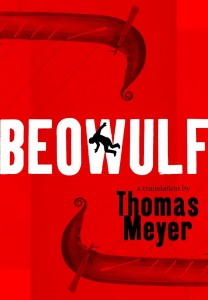
A new publication of Beowulf translated by the poet Thomas Meyer has been recently released by Punctum Books. It is edited with a preface by David Hadbawnik, and includes an introduction by Daniel C. Remein, and an interview with Thomas Meyer.
Hadbawnik writes: “This is an open access publication, which means it’s available for free download; however, there is also an option to purchase a physical copy of the book, and I would urge anyone who’s interested in Tom’s work, Old English poetry, or supporting independent publishers to buy a copy. Tom’s translation was done 40 years ago during his studies at Bard, and it’s pretty groundbreaking, especially compared to what poets have usually done with this poem.”
Spread the word!
Interview :: Judy Norsigian: Our Bodies, Oursleves
“When a small group of women published the first edition of Our Bodies, Ourselves in the early seventies, it was one of those books young women hid the book from their parents and husbands. Jerry Farwell called it ‘obscene trash.’ Recently, Time Magazine named it one of the best non-fictions books of the 20th century. No matter how you reacted, there’s no mistaking it was a ground breaking book, one that’s now considered iconic.”
Bob Barrett interviews Judy Norsigian, Executive Director of Our Bodies, Ourselves, on WAMC Northeast Public Radio’s The Health Show (#1274). You can listen online or go to their podcast page to subscribe on iTunes.
For those of us who remember hiding the book and sneaking reads of it, and for those of you who could never imagine such a time, this is an interview well worth a listen as Norsigian talks of the importance of women’s health issues forty years ago when the book was first published and what has and hasn’t changed in our society today.
Spread the word!
Short Fiction Contest Winners
The American Short Fiction 2012 Short Story Contest winners have been announced. First place winner James DeWille’s story “Last Days on Rossmore” is featured in the most recent issue of American Short Fiction. The contest judge, Justin Cronin, says, “This story grabbed me right away with its off-kilter scenario, compact characterization, and downright zingy dialogue. Everything here felt completely original, nothing that had ever been written or imagined before, which is the hallmark of a first-rate short story.”
Second place (not printed in the issue) goes to Suzanne Barnecut for “On Great Mountain.” The announcement on the website says that “Cronin admired its deft use of second person and said the story is ‘full of wise observations.'”
Other writers in the issue include Max Ross (“Exorcising”), Elizabeth Ellen (“Teen Culture”), Alyssa Knickerbocker (“The Daughter of a Squaw Man Smuggles Wool and Other Goods”), and Roxane Gay (“We Are the Sacrifice of Darkness”).
Spread the word!
Barrelhouse Presents Dark Sky Magazine
In what can best be categorized as a major communication snafu, Gabe Durham, Editor of Dark Sky Magazine writes that after accepting submissions and, along several other editors, putting together issue #17 of DSM, he sent it off to the founder/publisher. The reply: Dark Sky was closing shop – both the magazine and the press. That’s when “the editors of Barrelhouse stepped in and generously offered to host the issue on their site. The editors and contributors [of DSM] were unanimously in favor of this idea.” Wow.
Issue #17 of Dark Sky Matter can be found here on the Barrelhouse website (though the cover image may make you sorry you looked – and yet, I’ll bet you’ll look at it twice!).
What a great show of support from Barrelhouse to all associated with DSM. I’m pretty sure it’s what Swayze would have done.
Spread the word!
NewPages Magazine Stand – September 2012
Got a bookstore or library near you with dozens of new lit and alt mags on the racks? Yeah, me neither, which is why we created the NewPages Magazine Stand for information about some of the newest issues of literary and alternative magazines. The Magazine Stand entries are not reviews, but are descriptions provided by the sponsor magazine. Sometimes, we’ll have the newest issue and content on our site before the magazine even has it on theirs. Good reading starts here!

